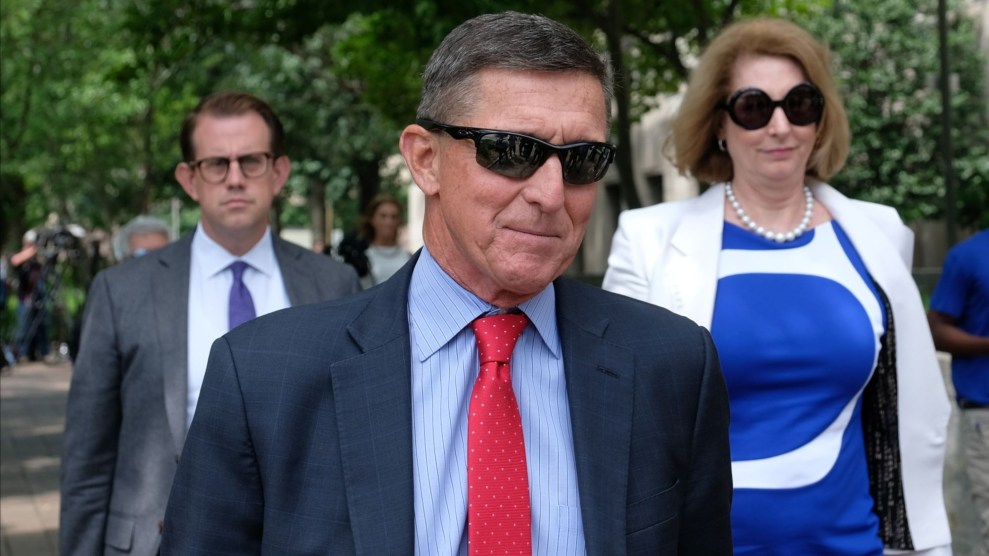
Michael Flynn leaves the federal court with his lawyer Sidney Powell on Sep 10, 2019.Manuel Balce Ceneta/Associated Press
Michael Flynn’s combative new legal strategy appears to be failing in federal court. But it is increasingly clear that Flynn is aiming at a different audience. He’s apparently hoping that by claiming he was targeted by overzealous prosecutors, he’s boosting the odds that President Donald Trump will pardon him.
Flynn pleaded guilty in December 2017 to lying to FBI agents about his interactions with Russia’s ambassador and agreed to cooperate with special counsel Robert Mueller’s office. Citing the value of Flynn’s cooperation, Mueller last year recommended that Flynn receive probation instead of prison time. But Flynn in June dumped the lawyers who negotiated his deal and brought on Sidney Powell, an appeals court attorney and Fox News pundit who has walked back her client’s acceptance of responsibility and alleged he is a deep state target.
During a hearing in Flynn’s case on Tuesday, Brandon Van Grack, a Justice Department prosecutor, suggested he may revise Mueller’s recommendation. Van Grack said the government “intends to refile” a memo recommending a new sentence for Flynn, who is tentatively schedule to be sentenced on December 18.
Powell said Tuesday that Flynn’s prosecution was tainted by “egregious government misconduct.” She also previously tried to revise Flynn’s admission, as part of his plea deal, that he had lied in a 2017 Federal Agents Registration Act filing submitted to the Justice Department regarding his secret lobbying for Turkey in 2016. That reversal caused prosecutors to drop plans to call Flynn as a witness in the prosecution of his former lobbying partner, damaging the value of Flynn’s cooperation. That may hurt Flynn’s cause with US District Court Judge Emmet Sullivan, who will assess Flynn’s cooperation in deciding on a sentence.
On Tuesday, Sullivan appeared deeply skeptical of Powell’s arguments that prosecutors had failed to provide Flynn with information necessary to aid his defense. Powell wants prosecutors to turn over material, some of it classified, supporting the conclusion that Flynn was not a Russian agent—something no one has alleged—and did not violate the Logan Act, which bars unauthorized civilians from negotiating with foreign governments. But Flynn was not charged with such matters. And Sullivan, though he put off ruling on motions filed by Powell until an October 31 hearing, repeatedly reminded Powell that the evidence she seeks must be relevant to the specific charges Flynn pleaded guilty to.
In a letter to Flynn made public on Monday, House Intelligence Committee Chairman Adam Schiff (D-Calif.) said the former national security adviser has failed to comply with a June 12 subpoena from the panel for documents and testimony. Flynn has also refused to comply with requests for information from the Senate Intelligence Committee, according to senators and a committee aide. (Schiff’s letter also rips Powell, accusing her of showing “a troubling degree of unprofessionalism” by actions like ducking calls from committee staff.) While Flynn’s cooperation deal with Mueller did not require him to assist Congress, Sullivan can take Flynn’s refusal to help lawmakers into account when he rules on a sentence.
The upshot here is that, by pushing long-shot arguments that he was set up by prosecutors, Flynn may have blown his chance of keeping prosecutors and Sullivan on his side. Sullivan seems poised to reject Powell’s claims about government misconduct as irrelevant to Flynn’s guilty plea, positioning prosecutors to cite Flynn’s drop-off in cooperation to successfully argue that Flynn should go to jail. Lying to a federal agent normally carries a sentence of zero to six months in prison, but Sullivan could theoretically give Flynn the statutory maximum of five years. Powell’s representation of Flynn, in this sense, has been a disaster.
But Powell’s claims are sure to do better in the right-wing echo chamber, where Flynn is already covered as a martyr and where Fox News is known to shape the president’s agenda. Already, Trump has apparently flirted with a Flynn pardon. In November 2017, Flynn’s personal lawyer, John Dowd, appeared to dangle a pardon in a voicemail left for one of Flynn’s attorneys. Dowd seemed to imply that if Flynn cooperated with Mueller without implicating Trump in wrongdoing, he could still receive a pardon. Dowd has denied that he intended to convey that message. But Flynn’s recent conduct suggests he’s betting such a deal might still be on table.














